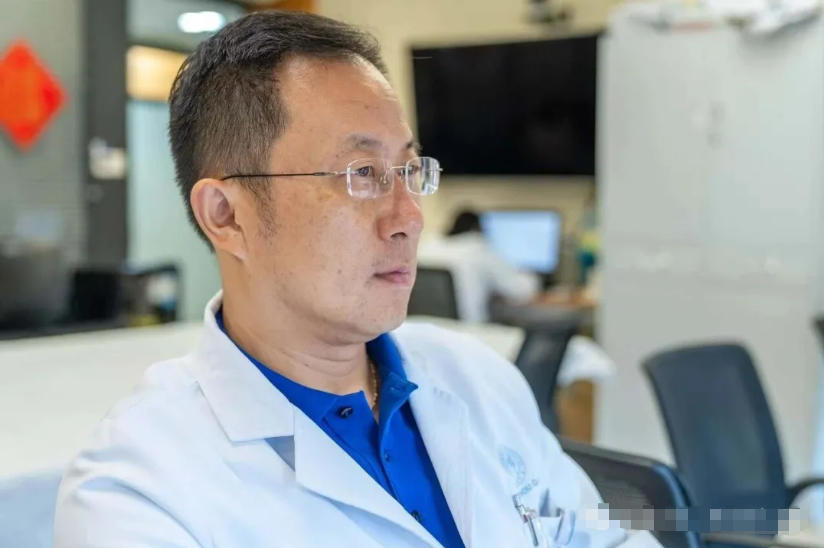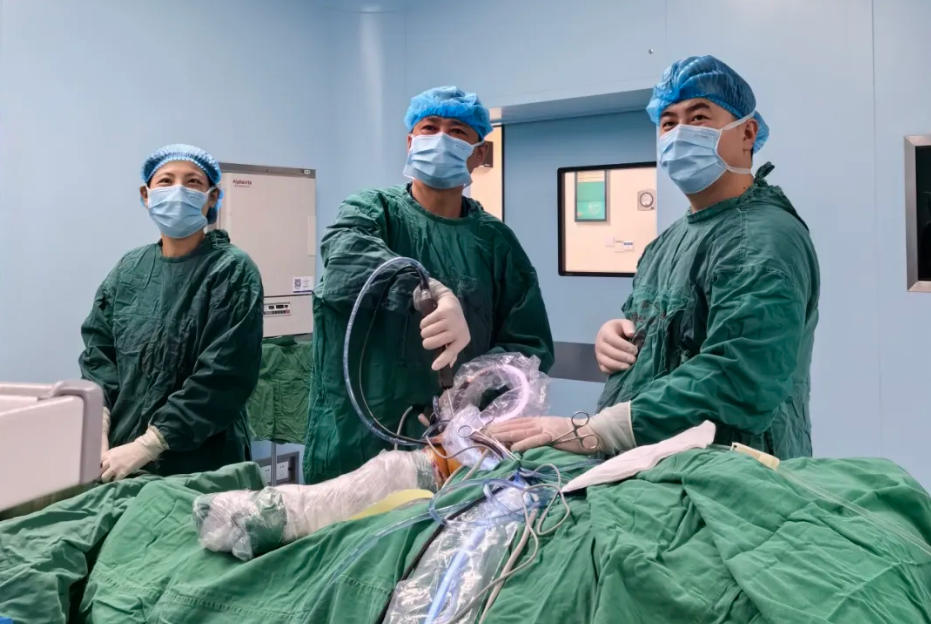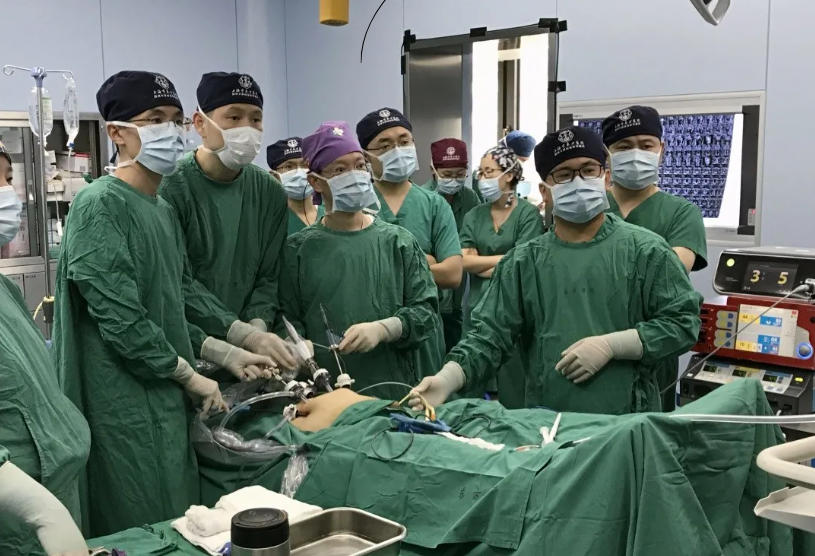Update time:2025-09-19Visits:1787

Mou Shan, Professor of Nephrology (Level 2),Chief Physician, Department of Nephrology, Party Secretary of Renji Hospital
Introduction:
In the northern ice city, the changing seasons—sculpted by nature itself—forged her unyielding resilience. On the challenging and unpredictable path of medicine, she has met every trial with optimism, nurturing her aspirations through youth and perseverance, allowing her dreams to bloom with warmth even in the coldest winters.
In the research and clinical practice of renal diseases, she seamlessly blends the wisdom of traditional medicine with the power of modern technology. With innovation as her key, she has unlocked new chapters in medicine, bringing renewed hope and possibilities to patients.
“The kidneys are the body’s largest excretory organs, and renal diseases intersect with numerous medical disciplines. Patients often present with comorbidities like hypertension or diabetes, even developing complications such as anemia or musculoskeletal disorders. To truly alleviate their suffering, we must master a diverse set of skills.”
Today, as an administrator, she continues to cultivate the field of medicine with unwavering dedication. Leveraging her forward-thinking vision and extensive practical experience, she drives the hospital’s development, mentors a new generation of medical talent, and presses onward without pause.
Though she has endured harsh winters, spring’s warmth always follows. Such is her journey in medicine.
The Path to Medicine
Mou Shan’s hometown, Harbin—a northern ice city renowned for its Ice Festival—boasts profound historical and cultural heritage. As a hub of the Chinese Eastern Railway, it was a crossroads where modern China intersected with the world. Diverse cultures, including Russian, Jewish, and Manchu, converged here, blending Eastern classical elegance with Western romantic charm.
In Mou Shan’s memory, the Songhua River was a nurturing river where children played year-round. She often dreams of Stalin Street along its banks—smooth cobblestone paths flanked by eclectic European architecture—a place echoing with childhood laughter and youthful aspirations.
“I chose medicine somewhat by chance, a product of its time,” she reflects. “I took the college entrance exam in 1991. For my generation, being-to-university was a big luck. I seized the opportunity, driven by an innate determination not to back down. Perhaps that inner resilience fueled my journey in medicine.”
After enrolling in medical school, Mou Shan immersed herself in studies like any aspiring doctor—memorizing texts, burning midnight oil before exams, and embarking on a path of medical exploration. Beyond academics, she found love during this period, meeting her life partner.
“My husband isn’t a doctor; he’s in engineering. I initially imagined a quiet life in Harbin after graduation. But his words reshaped my perspective: ‘Don’t settle. Forge your own path through strength and skill.’ That propelled me to pursue graduate studies.”
The road to graduate school was fraught with challenges. Mou Shan recalls struggling with English but persevering until her scores improved, securing her a master’s degree.
“My master’s program was at the Heilongjiang Academy of Traditional Chinese Medicine (now Heilongjiang Academy of Chinese Medical Sciences). While lesser-known in Shanghai, it’s a pioneering TCM institution founded in 1957. As a Western medicine student, choosing integrative medicine meant venturing into uncharted territory. For three years, I studied TCM and acupuncture, gaining deep insights into traditional healing. I shuttled between libraries and clinics, sacrificing weekends, yet found fulfillment in the rigor.”
After her master’s, Mou Shan pursued a doctorate. With a background in both Western medicine and TCM, integrative medicine was a natural fit.
“I sent applications to professors in Beijing and Shanghai specializing in this field. Professor Zhang Qingyi responded, and after rigorous exams, he accepted me.”
Professor Zhang, a distinguished internist and nephrologist at Renji Hospital, pioneered integrative treatments for kidney disease. His groundbreaking work on chronic nephritis and renal failure included co-authoring seminal texts like Practical Nephrology and Dietary Therapy for Kidney Diseases.
Receiving Renji Hospital’s doctoral acceptance letter remains an unforgettable moment of pride for Mou Shan—a validation of her efforts and a gateway to the future.
“Professor Zhang was in his sixties then. He was more than a mentor; he was family. In an unfamiliar city like Shanghai, he was my sole support. He guided me through academic dilemmas and daily challenges, inviting me to holiday gatherings with his wife as if I were their daughter.”
At Renji Hospital, Mou Shan found her calling. She delved deeper into integrative nephrology, driven to make her mark in the field.

Rooted in Renji, Witnessing Growth
“Renji Hospital isn’t just my workplace—it’s where my medical dreams took flight. I’ve witnessed generations of department leaders pour their wisdom and sweat into building its foundation. I hope to carry forward their legacy and contribute to Renji’s future.”
Beyond Professor Zhang, department leader Professor Qian Jiaqi’s visionary approach left a lasting impression. Under his leadership, Renji’s nephrology department achieved remarkable milestones.
“Professor Qian, a renowned nephrologist, revolutionized hemodialysis in China. In the 1970s, he helped develop flat-plate dialyzers, introducing clinical hemodialysis and transforming kidney disease treatment nationwide. In the 1990s, he established the Shanghai Hemodialysis Registry—the first Chinese database included in the US Renal Data System (USRDS), elevating China’s global standing in nephrology.”
Professor Ni Zhaohui, another guiding force, offered invaluable mentorship. Her rigor and diligence became Mou Shan’s benchmark.
“Under Professor Ni’s guidance, I learned to push research boundaries and apply integrative medicine clinically. She taught me empathetic communication—how to truly understand patients’ pain and needs.”
Recognizing her excellence, Professor Ni recommended Mou Shan for a program at Harvard University—a pivotal turning point. There, Mou Shan engaged with cutting-edge medical concepts, broadening her perspective on nephrology.
Yet life brought unforeseen hardships. During her time abroad, both her mentor and father passed away, deeply shaking her. These losses intensified her awareness of life’s fragility.
“When I returned to arrange my father’s hospitalization, grief weighed heavily. Yet I had to resume my studies. Colleagues and friends cared for him like family in my absence. That sense of belonging wasn’t just comforting—it crystallized my duty as a physician: every treatment and act of care rekindles hope for patients and their loved ones.”
At Harvard, Mou Shan dedicated herself to intensive research. Coincidentally, Renji’s leadership team, led by President Li Weiping, visited Harvard. She seized the chance to share her progress, receiving encouragement that bolstered her resolve.
“I outlined my research and novel ideas on integrative therapies. President Li shared Renji’s vision—talent development, innovation—and urged me to bring Harvard’s insights back to advance our hospital.”
From Researcher to Administrator
After returning from Harvard, Mou Shan resumed her clinical work, earning colleagues’ respect. However, a leader’s remark—“You’re suited for management”—launched her into uncharted territory.
“When President Li first suggested management roles, I resisted. As a frontline clinician, I loved my specialty and hesitated to leave it. But mentors advised: ‘You’ve excelled clinically; now the hospital needs your expertise to drive progress.’ Their words gave me pause.”
Torn between her passion and institutional needs, Mou Shan grappled with the decision. Ultimately, she chose to step outside her comfort zone.
“The night before applying, I barely slept, daunted by the unknown. But I embraced the challenge, knowing the transition would demand grit.”
Mou Shan joined the Human Resources Department, facing skepticism and resistance.
“Initially, it was tough. President Li faced pressure too; many doubted a clinician could manage. He gave me three months to prove myself, bluntly stating I’d return to clinical work if I failed. I never considered quitting.”
Undeterred, Mou Shan tackled the role head-on. She studied HR management, sought guidance, and gradually mastered the complexities.
“I devoured books on personnel management, consulted experienced colleagues, and honed my skills. I realized management is the hospital’s lifeline—shaping staff development and institutional future.”
Three months later, Mou Shan’s performance silenced critics. She brought fresh energy and innovative thinking to the role.
“Through effort, I learned to craft talent strategies, navigate personnel dynamics, and optimize resources. Colleagues began trusting my decisions and supporting my vision.”
This successful transition added a new dimension to her career and invigorated Renji’s talent development. It proved Mou Shan was not just an exceptional physician but also a capable leader. She subsequently served as HR Director at Renji, Personnel Director at Shanghai Jiao Tong University School of Medicine, and later as Deputy Party Secretary and Vice President of Renji Hospital. Today, she is a Standing Committee Member and Vice President of Shanghai Jiao Tong University School of Medicine.

Balancing Management and Research
“Joining the medical school, I knew fresh challenges awaited. Beyond overseeing education, I’d handle unfamiliar areas like logistics and assets. I also had to safeguard my research amid teaching and student affairs. Initially overwhelming, I soon realized management and research aren’t conflicting—they’re synergistic.”
Mou Shan’s approach to student leadership emphasizes autonomy and innovation. She encourages students to explore boldly and embrace challenges.
“I tell them: Medicine is a marathon, not a sprint. It demands patience, perseverance, and creativity. I urge them to pursue independent research while valuing teamwork—medical breakthroughs are never solo endeavors.”
In research, Mou Shan collaborates with leading scientists, pooling resources and insights to pioneer new directions. This model has yielded significant breakthroughs in nephrology.
In integrative medicine, her team studied Astragalus (Huangqi) extracts, exploring their therapeutic mechanisms in kidney disease.
“I’ve always sought to blend traditional wisdom with modern technology. Our work on Astragalus exemplifies this—we chemically isolate active compounds and investigate their clinical applications.”
For primary membranous nephropathy (PMN), her team collaborated with the Chinese Academy of Sciences to uncover its pathogenesis, revealing how BMP2 pathway activation in podocytes thickens the glomerular basement membrane.
They also established the largest single-cell transcriptome database for PMN, offering new insights into its pathology.
“Research must ultimately serve patients. I’ve always prioritized clinical needs, striving to translate findings into tangible treatments.”
Over the years, Mou Shan has witnessed the symbiosis of management and research. Management broadens her perspective, enabling better resource coordination for science; research keeps her academically sharp, enhancing her leadership efficacy.
Editor: Chen Qing @ ShanghaiDoctor.cn
If you'd like to contact Doctor Mou, please be free to let us know at chenqing@ShanghaiDoctor.cn.
Note: Chinese Sources from “The Path of Benevolent Medicine” which was published in 2024. It records 90 important medical figures in the history of Renji Hospital. Yewen Renyi (ShanghaiDoctor.cn) team was one of the major writers of the book and is authorized by Renji hospital to create English version on the website of ShanghaiDoctor.cn
Hospital: Renji Hospital, Shanghai Jiao Tong University School of Medicine
Dr. Zhou Qianjun | “Sculpting Life in the Chest” – A Portrait” – A Portrait
Dr. Cai Junfeng | Guarding Bone and Joint Health, Improving Quality of Life
Dr. Xu Xiaosheng|The Gentle Resilience of a Male Gynecologist
Dr. Shi Hongyu | A Cardiologist with Precision and Compassion
Dr. Zhang Guiyun|The Inspiring Path of a Lifesaving Physician
Dr. Chen Bin | Building the Future of ENT Surgery at Lingang,Shanghai
Prof. Zhang Baigen | The Oral History of China’s Vascular Surgery

Dr. Zhou Qianjun | “Sculpting Life in the Chest” – A Portrait” – A Portrait

Dr. Cai Junfeng | Guarding Bone and Joint Health, Improving Quality of Life

Dr. Cui Xingang | The Medical Dream of a Shanghai Urologist

Dr. Xu Xiaosheng|The Gentle Resilience of a Male Gynecologist

Dr. Shi Hongyu | A Cardiologist with Precision and Compassion

Dr. Zhang Guiyun|The Inspiring Path of a Lifesaving Physician

Dr. Jiang Hong | Bringing Hope to Vascular Frontiers

Dr. Huang Jia | A Journey of Healing "Breath"

Dr. Chen Bin | Building the Future of ENT Surgery at Lingang,Shanghai

Prof. Zhang Baigen | The Oral History of China’s Vascular Surgery